- Home
- Gentry Race
Psychonautz Page 2
Psychonautz Read online
Page 2
The actual bar to his left was diagonal, descending from one end of the room to the other, adorned with old paper money bills that were irrelevant in this day and age. The builders must not have leveled the bar when they installed it. It was slanted, following the mountain’s curve in a hasty manner. Just behind the bar, a human twice his size was wearing an apron and tending to the usual materials used to conjure the hangover any fine patron sought after.
Nathan sat down after Richter at one of the bar seats, his body awkwardly positioned at the slanted bar. The wall behind the bar was ornamented with tacky memorabilia from Earth, strikingly reminiscent of a pop culture long since gone.
“What’ll it be, big fella?” the bartender asked. Nathan didn’t mind being called “big fella” because he knew he carried his weight well. His stockiness was due to conditioning, a product of his environment.
“Beers,” Nathan said.
“It’s not quite beer, but it’ll get the job done,” the bartender said.
The bartender let two cold, frothy pints slide down the slanted bar. Both glasses came to a halt on their own, perfectly in front of each brother, iced over like they’d been sitting outside in the chemical slush for too long. The creamy head spilled over a little.
“That’s a neat trick,” Nathan said, looking around at the other patrons two seats away from him. They seemed unamused.
The bartender leaned in surreptitiously, checking for eavesdroppers, and said, “Magnets.”
Nathan tilted his head and faced his brother. He tried not to show the upper hand in terms of intelligence, but the purpose of the slanted bar really bugged him.
“Are all the taverns designed this badly?” Nathan asked.
“It's the cryovolcanic activity. Always moving. Say, speaking of moving, you must be the new bunker detail.” The bartender’s amused explanation interrupted the brothers, and he pointed to Nathan’s amber glasses. “What’s with the shades?”
“Looks like I’m a celebrity,” said Nathan, looking at his brother with a furrowed eyebrow. “My life’s so bright, old man, I gotta wear ‘em.”
The bartender smiled, revealing a set of crooked teeth that matched the broken bone in his nose.
A man and a woman were stirring a commotion near the back of the smoke-filled room next to a large digital jukebox. The woman had bright, rainbow-colored hair and was wearing an outfit tighter than a drill instructor’s asshole. Nathan hadn’t seen a jukebox in years, not to mention what the woman was wearing. The yelling grew louder until the woman’s swearwords were silenced by a backhand to the face.
Nathan could feel his brother staring at him, followed by a nudge that told him to keep his eyes forward and mind his business. Richter always approached a stressful situation with a clear head. Maybe that’s what made them different, but what made them similar was their willingness to act.
A loud noise caused Nathan and his brother to look back and see that the woman had cracked a pool stick over the head of the man who’d slapped her, knocking him out. She flipped her rainbow-colored hair from one side to the other, revealing a smile on her wounded face that said she’d enjoyed the pain.
“That’s Fery. She can take care of herself,” the bartender said.
Just past Nathan, two rugged patrons kept playing their game of CRUD as they eyed Richter. One of them eventually spoke. “Say, we even have a decorated Cryonaut. You guys don’t usually frequent here too much. I’d mind your P's and Q’s, if you know what I mean.”
“Don’t mind us. We’re just here for some pints,” Richter said.
Nathan had heard it all before—same scene, different world—except that this time they were calling out his brother. Even though Richter was a “square bear” now, that didn’t mean he hadn’t earned those medals and patches, and the brothers would bust up some knuckleheads if they had to.
“And eating crayons. Don’t forget that we love crayons,” Nathan joked, approaching in a manner opposite of Richter but still helping to deescalate the situation.
Just over the bartender’s shoulder, next to an advertisement for a cheap pack of gum, Nathan caught a familiar face on a faded print article. A group of white-coated scientists stood in front of the Reform Facility. Nathan blinked his pale eye to make sure it wasn’t bugging out on him again. He got up and leaned in closer, but it was definitely her.
“Whatcha see?” Richter said
“Jesus! She’s here,” said Nathan.
“Who?”
“Nobody,” Nathan said and sat down to take a sip of beer, as if to reset the conversation.
“Bullshit,” his brother said, looking closer. “That’s right! Sasha Hastings. She’s one of our best. Working in technical research under the Reform Facility. You guys had a stint awhile back, yeah? That time-loop situation you used to rant about?”
“Yeah, after the Syndicate Event. We dated for a while, but it didn’t work out. Ancient history now.”
“That’s why you started taking that stuff?” Richter said. “That Ætheria crap?”
Nathan was quiet.
“Well, she was your commanding officer to start off. Probably for the best,” Richter continued. “She’s moved on to another asshole angrier than you.”
Nathan smiled slightly and looked at the map next to the article, trying to forget about his ex. Locations were marked in red around the Reform Facility, showing the small city growing just beyond it. He looked at Richter and asked, “Does anyone in that Reform Facility escape?”
“I did, sugar,” interrupted the girl from the back, her luminous hair more colorful up close. Her neck was covered in sloppily knifed tattoos that looked like past boyfriends of old. Nathan could tell she’d been broken by the system and built back up by the way she carried herself. Probably still asked permission to use the pisser.
“Oh yeah?” Nathan asked. “What was your crime, Ms. Petite?”
“The name’s Fery. Did a bang-up job on a credit station when I was twenty-something. Didn’t get my freedom till I was phased out. Did about ten years, honey,” Fery said, her southern accent more noticeable now.
“Is that how you got that hair?” Richter joked.
Fery sweltered with an angry look, like that of a sixteen-year-old who didn’t win the teddy bear at the carnival. Nathan knew Richter was just pulling her leg, even though they were shorter than the length of his arms.
“For your information, sugar,” Fery said, pointing to the nearby wall where a small, blonde-haired girl rode a horse on a rainbow, “Rainbow Brite is one of my favorite characters from the 20th.”
Nathan didn’t get the reference but could sympathize with her on a different level. Too many times he’d heard of a young, dumb mistake turning into a lifetime of regret. He looked closer at her hands. They were worn, her knuckles nearly showing to the bone, and she wore chipped, bright pink nail polish. She was a looker but seemed more of a fighter, what Nathan called a “feisty fiesta.”
“Seen much action in there, Fery?” Nathan asked.
“Yeah, they’re turning people into bug suits,” Fery said.
“Bullshit,” Richter scoffed.
“You’d be better off keeping your mouth shut, Fery,” the bartender said.
“I ain’t lying. They had me on Ætheria,” Fery said. “They still have Big Daddy Beightol on it. Making some kind of exosuit down there.”
Nathan could tell the other patrons didn’t want to hear what Fery was saying, but one thing was for sure: he knew these cats spoke his language, and the words came with fists. What they didn’t know was that Nathan and Richter could take ‘em all at once if they had to.
“Ætheria?” Nathan asked as he got up and approached Fery. “What do you know about that?”
Richter chimed in. “That stuff is scheduled Class One on Oyria. You’d be lucky to find it here.”
“Leave her alone, pig,” said the patron from the back, now awake, as he chucked a thick cue ball at Nathan’s head.
Nathan spun aroun
d and caught the ball with one hand. Everyone leaned back in awe as the drunken man charged the brothers. He threw a punch. Nathan intercepted it and cracked the cue ball over the man’s head. He fell to the floor in pain.
“That was for the lady,” Nathan said, winking at Fery.
A patron next to Richter picked up his frosty mug and swung it at him. Richter pulled his head back, just missing the heavy glass but taking a glop of beer to the face. He stood up, wiped the beer off his face, and knocked the man unconscious with one chin check. He then reached into his boot and pulled out a small dagger.
“Thank god for your lucky knife,” Nathan said with a smile.
“Jesus, Fery. Told you not to be picking fights in here,” the bartender said, then looked at Nathan and Richter. Registering a respect that could only be earned by their showing of it, he nodded.
“I think it’s time for you to go,” the bartender said.
Nathan was quiet, shaking his head and smiling at Richter’s need to throw a low blow on his ranking yet again. He slammed down the rest of his beer and paid the bartender one hundred credits for a beverage that tasted like urine.
“By the way, it tastes like piss,” Nathan said.
“Cause it is piss!” a patron yelled from the back. He lay uncomfortably by the fire, half dazed from the bruising he’d just gotten.
Nathan smiled, looking at his brother. “Just like old times, eh?”
Richter shook his head. “Yeah, leave it to you to find the fight.”
2
Sasha Hastings sat quietly at her desk, staring at a spreadsheet of data that would set an uneducated person aquiver. Her military fatigues were a dark green that contrasted sharply with her fiery red hair, and a bright white stripe along her sleeve identified her as a chief medical specialist.
Hastings was quickly interpreting the long lists of data. In fact, the process was faster than most terminals she’d interacted with. Having come a long way from her previous position as an infantry rocket specialist cadet and then sergeant squad leader during the Syndicate Event, her ambitions showed through earnest, hard work. After the Fall, Sasha had found that her minor in medical anatomy would allow her to obtain a more comfortable, less actionable position. She also felt as if she’d taken much and given little back to her fellow humans, and she wanted to use her particular skills to help mankind toward the greater good.
Hastings lit a candle just above her monitor, and the bold iron smell reminded her of home—a small colony, light years away from the Feed. Her parents were still there, living a hard life harvesting remnants from a supernova, but at least they were active. The candle was a specialty item made by her parents from the heavy metals they farmed. It first glowed orange and then changed to red, then green, and lastly blue. Hastings smiled ever so slightly.
Her eyes scanned the names of the Reform Facility inmates who were listed by height, weight, medical history, and psychological profile. The current column she was studying was by far the largest one, containing detailed notes ranging from personal fears to odd ticks a Reformer could have.
“Hey, Sasha, you want anything from the mess hall?” a man said from across the large room filled with endless displays of holographic monitors. He wore a suit like hers.
She ignored him, never lifting her eyes from the data. She had more important things to worry about than eating. Her upcoming meeting with General Graham would prove the most important of this entire project.
A developmental exosuit spun around on the holographic form on a screen in front of her. It was outfitted with portholes that manifested various weapons by user demand. She tied her red hair back into a bun that was tighter than the expression on her face, realizing that the results she studied were unanimous. She spoke into a small recording device.
“The spliced alien DNA from the bugs found here on Oyria and the quantum entangled source from the seed allows for successful conscious manifestation of voxels that are off the charts. It’s no coincidence that the raw source shares a structure similar to the designer drug Ætheria; hence, I am naming it Æther. Level One Æther can voxelize simple stabbing weapons almost straight out of the box, but if there isn’t a cranial abscess present to fold the new grey matter into, the experiment fails and the subject exudes violent, uncontrolled behavior.”
Sasha Hastings paused for a moment, took a deep breath, and continued.
“The solution I’ve suggested tests Reformers for heavy use of cerebral-altering entheogen-like Ætheria. Use has provided the necessary holes in the brain to fill without extracting valuable grey matter, despite working with less than… perfect subjects. In addition, Psychonautic therapy is proving to be valuable in controlling hidden aspects of the mind and obtaining a Level Two Æther manifestation. My only hope is that General Graham okays this new course correction.”
“Uh, Sasha?” the man said again, reaching for a small stick that was affixed with a spider-shaped paper cutout hanging from a string. “You want something to…”
The man dangled the paper arachnid in front of her face, startling her. She broke concentration, and within a quick second she’d knocked away the weapon he held and began to choke him, instinctively grabbing an aerosol can and lighter sitting nearby.
The man had “stupid” written all over his face.
“Jesus, Hastings. I was just kidding. I know this exosuit is gonna be groundbreaking, but you really need to take it easy. When was the last time you ate?”
Hastings looked as if she had snapped out of a trance, focusing first on her frightened colleague’s face and then glancing down at the paper arachnid. “You know damn well I hate fucking spiders, Ralph. Now, get out of here. I have to meet with Graham soon.”
Ralph smiled, breaking her hold and fixing his uniform, “Yep, and I bet it doesn’t help that they grow bigger here in the lower gravity, right?”
“Yeah,” Hastings said, “you’re lucky I didn’t have a torch. I would have burned down the whole place just to get it.”
“Damn,” Ralph said. “Please keep that pyromaniac inside of you under control.”
Ralph left through a large, thick metal door that connected and locked at the center. Hastings looked back at the charts, shaking her head and trying to cleanse the thought of an arachnid from her mind. They did indeed grow bigger here than the spiders back home — arm sized. They looked like goddamn land crabs. Even though office pranks were not few and far between, she took pride in her work, unlike some of her immature colleagues. One would think they’d take the work more seriously. It wasn’t every day that labs were dissecting alien DNA and splicing it into test subjects. On Earth, their experiments would be considered heinous crimes, but here, Rockheed was willing to take that chance for the next step in human evolution—to help mankind thrive.
Hastings reached over and grabbed the paper arachnid that she could now see was obviously a myriad of folded (albeit important) pieces of paper from around the office. And since paper was hardly ever used anymore and a fairly rare commodity, it was a shame Ralph had decimated it in jest.
She looked closer at the ancient paper format that evoked a more visceral memory than a digital data slice would have. A picture was glued on the inset of the spine. She recognized the face of a man and the woman posing next to him, in center frame. One eye was discolored a greyish white. It was Nathan—and her.
She looked at his mountainous frame, missing the times they’d had together, but her “hype” days were long gone. He’d always been funny, but was also a bit of a hothead. When Hastings’ mother had gotten sick and the VA benefits ran out, Hastings had had no choice but to stay with her mom and help, and that was when Nathan decided he wanted a different life.
It wasn’t long until she’d met an up-and-coming officer who showed her what a man could be, a man named Edward Tang. Tang was far from perfect, with his temper and foul mouth, but at least he wasn’t dependent on drugs anymore. Sometimes she felt that that was the only reason she liked him—something familiar
from her past, yet different.
She threw the folded paper arachnid into a drawer and slammed it closed, trying not to let her thoughts run through their natural progression. She’d ended up losing her mom to cancer that year. After that, she’d sworn she would find a way to fix the human condition, particularly the frailty of the body.
Suddenly, a buzzing ring pulled her from her reverie and alerted her that it was time.
On the other side of the triple-reinforced glass door, the person who could make it all come to fruition, General Graham, glared back at Sasha Hastings with less-than-impressed eyes. His suit was as sharp as the sunken-cheeked jaw line that climbed to his peppered hair. Some said he looked like an asshole waiting for an enema, but Sasha didn’t mind his arrogance.
Graham was all business, stoically waiting for clearance to proceed through the door. He was fresh off the boat, so to speak, from Rockheed’s Arial Officer Station high in the sky. He held a glass holoboard in one hand, flipping through its digital bright blue pages.
The door swished open and Graham stepped into the concrete building that acted as a top-secret experimentation facility for Rockheed. Hastings quickly scented the room with warm cotton and plush linen to add a more charming character to the cold concrete walls. She took pride in the facility’s cleanliness, ordering the prison Reformers to complete frequent detailed cleanings.
“General, thank you for coming,” Hastings said.
Graham was quiet, scanning the facility and then looking back at her.
“It has come to my attention that this facility is experiencing a number of failing test subjects,” the general said, sidestepping Hastings and continuing to walk.

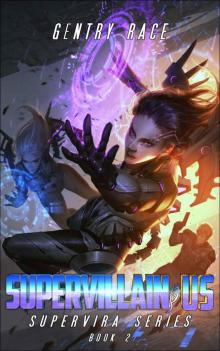 Supervillain, Us
Supervillain, Us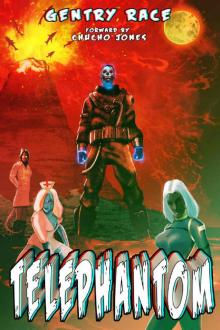 Telephantom
Telephantom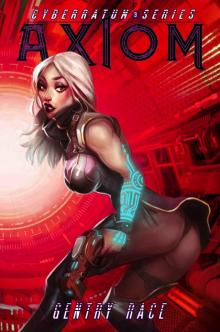 Axiom
Axiom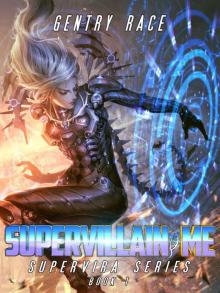 Supervillain, Me
Supervillain, Me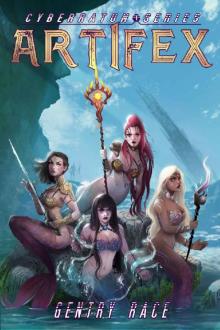 Artifex
Artifex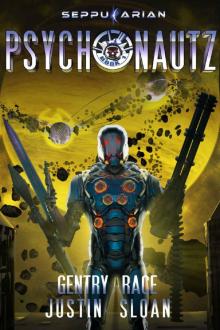 Psychonautz
Psychonautz